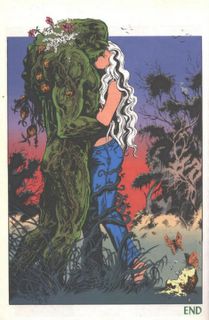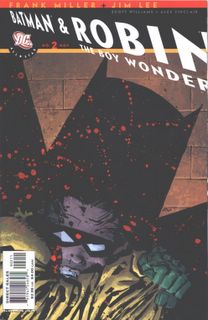 Swamp Thing: Love and Death (#28 - #34)
Swamp Thing: Love and Death (#28 - #34)I'm continuing on with my journey to discover why everyone loves Alan Moore's
Swamp Thing so much. Here's my
lukewarmish review of the first book.
The first story in
Love and Death is "The Burial", where the Swamp Thing, having realised he is an imitation of the deceased Alex Holland, buries Holland's remains. Funerals are always sad - I'm tempted to put in a joke about looking forward to Margaret Thatcher's, but I won't - and writer Alan Moore has little to do in order to craft a sad, contemplative story.
Now I need to admit that horror is not my favourite genre, if only because of my habit of bursting out laughing during the scary bits, and perhaps that is part of my reason for not loving
Swamp Thing. The second arc in this book is as good a piece of comic book horror as you're likely to find: a fetid, claustrophic tale about resident heartthrob Abby. Her husband, now a demon, has joined a company called "Blackriver Recorporations" - bit of a clue there's something dodgy here, I would have thought - who specialise in bringing murderers back to life. I'm beginning to understand why Abby's hair is whitest white as she gets held captive by reanimated corpses and covered in crawling insects. It all made me want to have a shower at the end.
The third arc takes us deep down into the underworld to rescue Abby's soul where it's been stashed by a malicious demon. The book's introduction suggests this has Dante's Inferno as its influence, but I'm inclined to think that, if so, it's by way of
Ghost Rider,
Son of Satan and Mephisto in Stan Lee's
Silver Surfer. We also have an unwarranted incursion by regular DC scarydude, the Spectre. But I'll forgive that from someone who can write lines like,
"She must not remain in this place, no matter how grotesque our quadrille may become".
And there's my old friend again, the rhymin' demon, the wit from the pit, the penner from Gehenna, the Ezra Pound from underground, the Shelley from, er, Hell-y - yes it's
Etrigan. He's armed with a fresh stash of deliberately anachronistic poetry, and Swamp Thing simply has no answer. I'm convinced the way to defeat Etrigan is to manouevre him into ending the first line of a stanza with something unrhymable like "orange", and then, while he's lost in thought, smack him in the face with some
e.e. cummings. Actually, Etrigan's verse has improved from the last volume. If only he'd read something more recent than Samuel Taylor Coleridge.
Then we're only my favourite story in this volume, Pog. Apparently a homage to Walt Kelly's Pogo Possum, but the spirit of Lewis Carroll looms large. This is a strange tale of comedy aliens (sample dialogue:
...and don't be unmembered to tell the tadling, and see if old strigiforme is fetchable nowabouts) who land in the swamp. Matters turn dark when one is killed by crocodiles: Moore demonstrating how utterly devastating a technique it is to introduce tragedy into the lives of comedy characters. Neil Gaiman used this in one of
Sandman stories, though his butchered childhood toys got resurrected in the end - a typical display of affection by Gaiman towards his characters and his readers.
Following a dream sequence story which has the look of a fill-in (
"Write a dream, lose a reader" is what I was taught), we're onto the final story,
Rite of Spring, where Abby and the Swamp Thing begin their love affair. I'm afraid I'm a complete sucker for a love story, even one between woman and plant life.
"You need more from love than the taste of lime", says the Swamp Thing. Now that, Etrigan, is poetry.
I'm a bit disturbed by the consummation of their love, which involves Swamp Thing popping a psychotropic tuber from his ribcage. I have a horribly weak stomach, and just the thought of eating it makes me queasy (it did more to Abby in an earlier issue, where the concept gave her a major upchuck). They then enjoy a multicoloured, psychedelic union and finish it off with a
snog while the Swamp Thing sprouts daisies. Bewildering, but undeniably beautiful.
Influence WatchMoore is a writer who likes to drop quotes into his stories. I'm sure I've missed some, but here are a few:
Page 111: "Friends and other strangers"
From Bob Dylan's
Gates of EdenThe foreign sun, it squints upon
A bed that is never mine
As friends and other strangers
From their fates try to resignPage 128: "How precious. Let this blossom be my fee, to plant within yon dark satanic mill"
From William Blake's
Jerusalem.
And did the Countenance Divine
Shine forth upon our clouded hills?
And was Jerusalem builded here
Among these dark Satanic mills?Jerusalem is the unofficial English national anthem, at least among those of us who detest
God save the Queen. Sadly not the same as the Sex Pistols' version, this tedious dirge, invoking the non-existent to rescue the unelected, renders our sportsmen incapable of anything more than stunned torpor in the face of wild Frenchmen singing the Marsaillaise.
Page 142: Pog
As far as I know, Lewis Carroll kicked off the whole made-up word concept with poems like
Jabberwocky"And, has thou slain the Jabberwock?
Come to my arms, my beamish boy!
O frabjous day! Callooh! Callay!'
He chortled in his joy.Page 178: In the history of the world, there have come sour times when the Earth feels compelled to create an elemental champion for itself
"Sour times" - this time it seems to be Moore doing the influencing, to Bristolian grumpsters
Portishead, who make classy music at
shockingly irregular intervals. "
Sour Times" is one of their best songs, though I would judge not one to play if you're recovering from a traumatic break up.
Cause nobody loves me
It's true
Not like you doPortishead's lead singer is
Beth Gibbons, whose album (with Rustin Man - ie a bloke who used to be in "Talk Talk")
Out of Season is the most lovely piece of music this decade has produced, and, damn it, I'm going to shamelessly plug it. Curiously, Mrs Clone finds it annoying, mainly due to Gibbons' Billie Holliday-esque voice on
Romance and my tuneless impersonation thereof.








